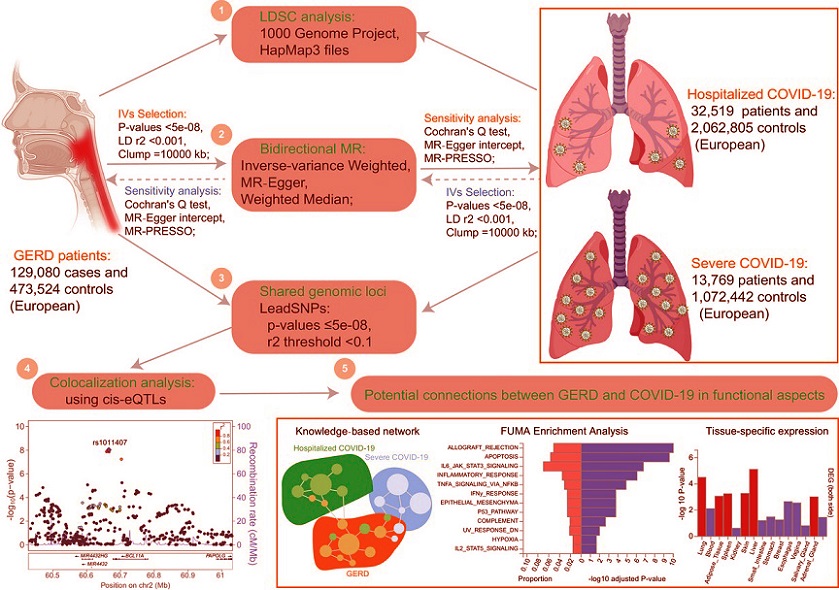Nikhil Prasad Fact checked by:Thailand Medical News Team Nov 14, 2024 1 year, 4 weeks, 1 day, 6 hours, 44 minutes ago
Medical News: Researchers from Zhejiang Provincial Centers for Disease Control and Prevention in Hangzhou, China, have uncovered evidence that individuals with gastroesophageal reflux disease (GERD) may face a higher risk of severe COVID-19 outcomes. Using a mix of Mendelian randomization and genetic analysis, the study sheds light on how GERD could play a role in making COVID-19 infections more serious for those affected. This
Medical News report examines how GERD-related genetic predispositions may influence COVID-19 risks, offering fresh insights into the relationship between these two conditions.
 Gastroesophageal Reflux Disease (GERD) Increases Risks of COVID-19 Severity
The flowchart of the analyses performed in this study. The design of the study and the workflow of the selection of instrumental variants and analytical methods.
Gastroesophageal Reflux Disease (GERD) Increases Risks of COVID-19 Severity
The flowchart of the analyses performed in this study. The design of the study and the workflow of the selection of instrumental variants and analytical methods.
The study involved large-scale genetic analysis, examining over 600,000 people with GERD and more than two million people with severe or hospitalized COVID-19 cases. It focused on identifying shared genetic markers and pathways that could link the two conditions. The findings suggest that those genetically predisposed to GERD might have a higher susceptibility to serious COVID-19 outcomes, potentially driven by overlapping genetic markers and immune responses.
Key Findings of the Study
A significant finding was the strong genetic correlation between GERD and both hospitalized and severe COVID-19 cases. Through Mendelian randomization analysis, a causal impact was identified, showing that genetic factors predisposing individuals to GERD also increased the odds of severe COVID-19. Specifically, the analysis revealed a 33% increased risk of hospitalization and a 27% increased risk of severe COVID-19 for GERD patients. These findings suggest that genetic predisposition to GERD could have a directional effect on COVID-19 susceptibility, highlighting a unique link between these seemingly unrelated conditions.
Further, the study identified a shared genetic locus associated with GERD and severe COVID-19, located on chromosome 2p16.1. This region contains the BCL11A gene, a transcription factor that plays a crucial role in immune cell development and response. The researchers hypothesize that this genetic overlap may help explain the heightened COVID-19 risk among those with GERD, especially since the BCL11A gene is involved in immune pathways that drive inflammation. By connecting these pathways, GERD may prime the body for an intensified inflammatory response, which could worsen the outcome of COVID-19 infections.
The Role of Immune Activation and Inflammation
The study delved into how GERD-related genetic factors may influence immune system responses. Through pathway enrichment analysis, the researchers found that the genetic markers shared by GERD and severe COVID-19 were linked to inflammation-related pathways. For instance, the IL-6-JAK-STAT3 signaling pathway, known for its role in immune
responses, was prominent. The TNF-alpha signaling pathway, which triggers inflammation through the NF-kB protein, was also activated. This inflammatory cascade is commonly observed in cytokine storms, a severe immune response linked to critical COVID-19 cases.
Interestingly, the shared genetic markers were mainly expressed in lung and blood tissues, two areas directly impacted by COVID-19. The study also found notable activity in adipose tissue, linking these inflammatory processes to obesity - a known risk factor for severe COVID-19. On the other hand, expression levels were low in the brain, suggesting that while GERD may increase COVID-19 severity, its impact might be less pronounced in neurological contexts.
Implications for GERD Patients During the Pandemic
The genetic links uncovered in this research could have significant implications for GERD patients, especially as they consider their COVID-19 risk profile. For those genetically predisposed to GERD, this research suggests that they may benefit from proactive COVID-19 protection measures, such as vaccination and possible booster doses. Understanding these connections could allow healthcare providers to identify patients who are at higher risk for severe COVID-19 complications and adjust their preventive care accordingly.
While this study highlights the importance of genetic predisposition in GERD and COVID-19 severity, it also underlines the role of immune system responses. The BCL11A gene and associated inflammatory pathways could serve as potential targets for future therapies, particularly in managing the dual impact of GERD and COVID-19. Treatments that modulate immune responses or reduce inflammation may benefit GERD patients at risk of severe COVID-19.
Limitations and Future Research Directions
One of the strengths of this study is its use of Mendelian randomization, which minimizes confounding factors often present in observational studies. By focusing on genetic factors, the research offers a clearer view of the GERD-COVID-19 link, free from lifestyle or environmental influences. However, the study also has limitations. For instance, it relied exclusively on data from individuals of European descent, which may limit its generalizability to other populations. Future studies could benefit from including diverse populations to validate these findings more broadly.
Additionally, while the research focused on genetic links, it did not consider environmental or lifestyle factors that can influence both GERD and COVID-19 outcomes. These factors, such as diet, smoking, and stress, are well-known contributors to GERD and may also impact COVID-19 severity. Further research that combines genetic and environmental data could provide a more comprehensive understanding of this relationship.
Conclusion
This study provides compelling evidence of a genetic link between GERD and severe COVID-19, revealing that GERD patients may face a heightened risk due to shared genetic pathways and inflammation-related immune responses. The findings underscore the importance of monitoring GERD patients closely during the ongoing pandemic, as their genetic makeup may predispose them to worse COVID-19 outcomes. By identifying specific genetic markers like the BCL11A gene, this research opens the door to targeted treatments that address both GERD and COVID-19, potentially improving outcomes for at-risk patients.
The study findings were published in the peer-reviewed journal: Annals of Human Genetics.
https://onlinelibrary.wiley.com/doi/10.1111/ahg.12584
For the latest COVID-19 News, keep on logging to Thailand
Medical News.
Read Also:
https://www.thailandmedical.news/news/american-pharma-giant-pfizer-to-settle-more-than-10000-lawsuits-for-its-gastric-reflux-drug-zantac-that-causes-cancer
https://www.thailandmedical.news/news/doctors-from-cleveland-clinic-warn-that-while-covid-19-can-cause-gerd-some--covid-19-sequelae-can-mimic-gi-diseases
https://www.thailandmedical.news/news/polish-study-finds-that-exposure-to-sars-cov-2-virus-leads-to-long-lasting-dyspeptic-symptoms
https://www.thailandmedical.news/news/covid-19-is-also-able-to-cause-gastric-reflux
https://www.thailandmedical.news/news/health-news-university-of-minnesota-study-finds-that-long-term-use-of-ppis-for-gastric-reflux-linked-to-higher-risk-of-developing-dementia
